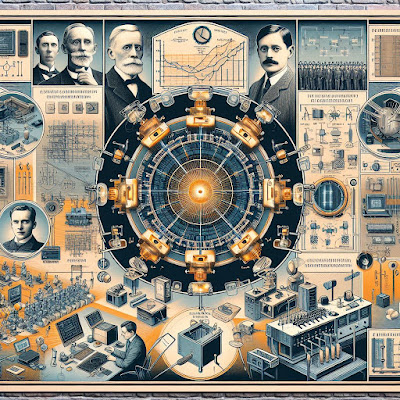What is quantization of charge
Hi guise let's explore what is quantization of charge ,Quantization of charge is a fundamental concept in physics that refers to the discrete nature of electric charge. In simple terms, it means that electric charge cannot exist in arbitrary amounts but rather in multiples of a fundamental unit. This concept was introduced by the French physicist Albert Einstein in the early 20th century.
- - The electric charge of any object is quantized, meaning it exists only in discrete values.
- - Now if we talk about elementary charge, denoted as 'e,' is the fundamental unit of charge.
- - The quantization of charge is a consequence of the discrete nature of matter at the atomic and subatomic levels.
after getting information of what is quantization of charge let's know why is it important?
some things i want to say if you want to learn more about charge and want to dive into information of electrostatics please visit this page also thanks.
pages:
- about charge with home made examples
- electric field and application (in easy way )
- electric force most important concepts with examples
- charge density (linear, area, volume with most helpful important examples )
- in-depth about charge with experiments
- what is electric flux: know every things about it with iits examples
- Application of gauss law
Why is charge quantized?
Charge quantization stems from the fundamental properties of matter at the atomic and subatomic scales. It is closely linked to the discrete nature of elementary particles, such as electrons and protons, which constitute matter.
- - The quantization of charge is a result of the discrete distribution of electrons in atoms.
- - Elementary particles, like electrons, carry a specific charge in multiples of the elementary charge 'e.'
- - The quantization of charge ensures stability and predictability in electrical interactions at microscopic levels.
How was the quantization of charge discovered?
The discovery of the quantization of charge is attributed to the renowned physicist Robert A. Millikan, who conducted the famous oil-drop experiment in 1909. This groundbreaking experiment provided direct evidence for the quantization of electric charge.
- - Robert A. Millikan's oil-drop experiment demonstrated the discrete nature of electric charge.
- - The experiment involved measuring the charge on tiny oil droplets suspended in an electric field.
- - Millikan's work confirmed the existence of the elementary charge and its multiples.
What is the elementary charge?
The elementary charge, often denoted as 'e,' is the basic unit of electric charge in the quantization of charge theory. It plays a crucial role in understanding the discrete nature of electrical phenomena at the atomic and subatomic levels.
- - If we talk about elementary charge is approximately equal to 1.602 x 10^-19 coulombs.
- - All charges observed in nature are integral multiples of the elementary charge.
- - Electrons, one of the fundamental particles, carry a negative elementary charge, while protons carry a positive charge of the same magnitude.
How does quantization of charge impact electronic devices?
The quantization of charge has profound implications for the functioning of electronic devices, shaping the principles underlying modern electronics and technology.
- - The discrete nature of charge ensures the stability and reliability of electronic components.
- - Digital information processing relies on the quantization of charge to represent binary states (0s and 1s).
- - Semiconductor devices, such as transistors, operate based on the controlled flow of quantized charge carriers.
In summary, quantization of charge is a foundational concept in physics, describing the discrete nature of electric charge at the atomic and subatomic levels. This concept, discovered through experiments like Millikan's oil-drop experiment, is vital for understanding the behavior of matter and has significant implications for electronic devices and technology.




